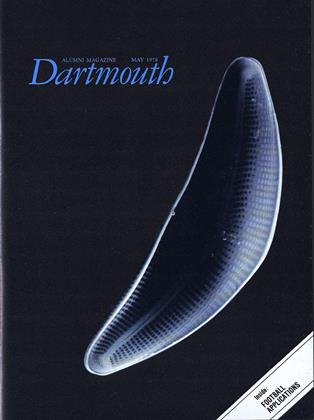In the past few months Dartmouthhas lost several of its latter-daypatriots, among them formerTrustee Harvey Hood '18, emeritus Professors Allen Foley '20and John Hurd '21, and retiredVice President John Meek '33,who in his time was overseer ofmost of the College's business,financial, and legal affairs. Lessthan a year past retirement. Meekdied after a ski run at Aspen,Colorado, in March. (He lovedskiing. The picture shown here,dating from some years ago, isas fitting a memorial as one takenin a boardroom.) As suggested inhis obituary in the last issue, Meekearned respect in an astonishingvariety of endeavors one ob-server recently commented thatthe triumvirate of Hood, JohnSloan Dickey, and Meek "ranthe College for 25 years." At theRollins Chapel memorial servicefor John Meek, this is what Presi-dent Dickey said of his longtimefriend and colleague:
JUST last June we gathered to pay tribute to John Meek as he retired after nearly a third of a century of service as the principal steward of Dartmouth's material well-being. Today, only eight months later as the calendar measures our days, we gather here as family, friends and former colleagues to remember him as one with whom, in work and play, we shared the joy and the travail, in truth, the wonder of Dartmouth undying.
I shall not now say more about John's notable career as a stalwart servant of the College than to bear grateful witness, that while each of us is all too mortal, it is only out of lives such as his that the wonder of Dartmouth's undying is created. It surely is fitting, however, that we turn our remembering for a few moments to what, after love of family, was the orienting impulse of his life. I speak, of course, of his abiding attachment to all things Dartmouth.
Many efforts have been made to identify the essence of the well-nigh fanatical belonging that Dartmouth has called forth in her sons for over two centuries, but I believe no one has come closer to understanding the spirit of her fellowship than Dr. Tucker, the ninth President of the College, when he characterized it as "place loyalty." Dr. Tucker, of course, was referring to "place" as not merely a fact of physical geography - although it is surely in large part just that; no, Dr. Tucker was speaking more comprehensively of the place as the institutional embodiment of all that over the years has gone into fashioning the Dartmouth experience - "experience," in lower case, of course. It was precisely in this sense that John Meek personified a loyalty to this place that reached into every corner of his life and work.
He was a superb steward of the College's material resources, but in large measure he was that because he cared about and understood all else that, generation in and generation out, has gone into making Dartmouth a singular place. He understood and believed in the purposes of a liberating education. He honored in person and conviction the role of the intellect in the higher learning of both teacher and student; he cared greatly about keeping Baker Library to the fore as a beacon light of Dartmouth's commitment to excellence; and on the opposite side of the campus, as a patron of the arts he enjoyed and staunchly supported the Hopkins Center.
Strange as it may seem in such a one, he relished competitive athletics and enjoyed being fiercely partisan where Dartmouth was concerned. He almost singlehandedly created the Dartmouth Skiway, and to cap it all, just to be sure the Dartmouth skiing team had the material it needed, he and Jean produced a varsity alpinist for a son. All of which permits me to say that not only was John an unabashed partisan in all his doing, he was also a perfectionist, particularly in his choice of a mate. In their lives and work, in both College and community, Jean Meek, in the finest sense, was a match for this extraordinary man. Together they enriched the place that is Dartmouth.
This college never produced a truer believer than John Meek. If there are a few like him in Dartmouth's future it will be a fitting monument to his example and his love of the place.
 View Full Issue
View Full Issue
More From This Issue
-
 Feature
FeatureCould it be that the political animals are hibernating?
May 1978 By Anne Bagamery -
 Feature
FeatureRev. Frisbie's Wonderful Discovery
May 1978 By James L. Farley -
 Feature
FeatureCastles in the Clouds
May 1978 By George Hathorn -
 Feature
FeatureThrough a Lens Brightly
May 1978 -
 Article
ArticleKeeper of the College Attic
May 1978 By M.B.R. -
 Article
ArticleMy Dog Likes It Here
May 1978 By COREY FORD










